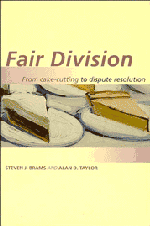Book contents
- Frontmatter
- Contents
- List of figures
- List of tables
- Acknowledgments
- Introduction
- 1 Proportionality for n = 2
- 2 Proportionality for n > 2: the divisible case
- 3 Proportionality for n > 2: the indivisible case
- 4 Envy-freeness and equitability for n = 2
- 5 Applications of the point-allocation procedures
- 6 Envy-free procedures for n = 3 and n = 4
- 7 Envy-free procedures for arbitrary n
- 8 Divide-the-dollar
- 9 Fair division by auctions
- 10 Fair division by elections
- 11 Conclusions
- Glossary
- Bibliography
- Index
11 - Conclusions
Published online by Cambridge University Press: 05 July 2011
- Frontmatter
- Contents
- List of figures
- List of tables
- Acknowledgments
- Introduction
- 1 Proportionality for n = 2
- 2 Proportionality for n > 2: the divisible case
- 3 Proportionality for n > 2: the indivisible case
- 4 Envy-freeness and equitability for n = 2
- 5 Applications of the point-allocation procedures
- 6 Envy-free procedures for n = 3 and n = 4
- 7 Envy-free procedures for arbitrary n
- 8 Divide-the-dollar
- 9 Fair division by auctions
- 10 Fair division by elections
- 11 Conclusions
- Glossary
- Bibliography
- Index
Summary
In this brief concluding chapter, we draw attention to a few general themes that link the more specific findings of the book:
Fair division is an old subject with a rich past.
We traced concerns about fair division back to the Bible and ancient Greece, but probably in every culture issues of fair division have arisen and rippled through its institutions. Specific procedures, as well, have a venerable history, which have taken on different forms at different times. For example, divide-and-choose emerged as a legislative procedure in which one house divides and the other chooses in James Harrington's The Commonwealth of Oceana in the seventeenth century; nearly 350 years later it is the basis for allocating mining rights under the Convention of the Law of the Sea.
The pervasiveness of a fair-division ethic seems driven in part by its survival value. From a sociobiological perspective, the idea of giving people what they deserve – by reciprocating their help or kindness or, conversely, by not being responsive when they are not – leads to the development of conventions, customs, or even laws that institutionalize the allocation of goods or bads (like chores) with some modicum of fairness. It would be fascinating to study these from the perspective of the theory developed in this book, but we have chosen instead to concentrate on the theoretical analysis of procedures while offering some empirical illustrations.
- Type
- Chapter
- Information
- Fair DivisionFrom Cake-Cutting to Dispute Resolution, pp. 231 - 236Publisher: Cambridge University PressPrint publication year: 1996

